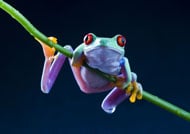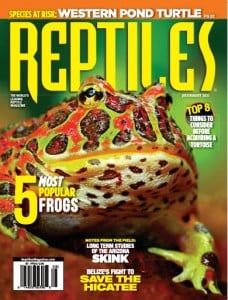Red-eyed Treefrog
Red-eyed leaf frogs are found throughout tropical Central America, from southern Mexico through northern Columbia.
Red-eyed leaf frog coloration is quite variable throughout their range. The form typically seen in the pet industry is brilliant green with blue sides mottled with vertically oriented, white reticulations. The ventral surface is completely white. The common name is derived from the bright red or crimson eyes these animals possess. When sleeping, the brightly colored sides and eyes of these frogs are completely concealed. Upon being startled by a predator, the bright sides and eyes are suddenly exposed, often startling predators and giving the frog enough time to escape.
Red-eyed leaf frogs can be kept quite simply in captivity, when provided with a few basic requirements. A variety of substrates will suit the needs of these frogs, including everything from simple paper toweling to more natural substrates, such as peat or green moss, coco coir, or a mixture of coco coir and orchid bark. It is important to have a drainage layer at the bottom of the enclosure, which can be made using either large grade pea gravel or LECA (expanded clay pellets), and then covering this with fiberglass window screening to prevent the finer substrate from filling the gaps in the bottom layer. Suitable plants include philodendron, pothos, Aglaonema, dieffenbachia, and other large-leaved sturdy plants. It is also important to provide a large, clean water dish to allow these frogs to soak regularly.
Red-eyed leaf frogs should primarily be fed a diet of crickets, with the occasional small mealworm or silk moth larvae. They should be fed every second or third day to maintain proper body weight. Food items should be dusted once weekly when feeding adult individuals, and at every feeding for developing froglets, still undergoing periods of rapid growth.

